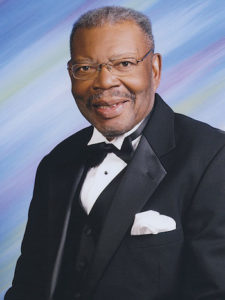
Robert L. Williams
*Robert Williams was born on this date in 1930. He is a Black professor emeritus of psychology and African and Afro-American studies.
Robert Lee Williams was born in Biscoe, Arkansas. His father, Robert L. Williams, worked as a millwright and died when his son was five. Williams’ mother, Rosie L. Williams, worked in the homes of white families until she died in 1978. He has one sister, Dorothy Jean. He married Ava L. Kemp in 1948 at the age of 18. They had eight children, 17 grandchildren, and 13 great-grandchildren. His eight college-educated children include four psychologists, a nurse, a journalist, a teacher, and a leather craftswoman.
Williams graduated from Dunbar High School in Little Rock at sixteen before attending Dunbar Junior College for one year. He earned a BA degree from Philander Smith College in 1953. He earned an M.Ed. in educational psychology from Wayne State University in 1955, when all graduate programs in the South remained segregated, and a Ph.D. in clinical psychology in 1961 from Washington University in St. Louis.
He worked as a staff psychologist at Arkansas State Hospital, the first Black psychologist hired at a state mental health facility in Arkansas. He later served as a chief psychologist at the Jefferson Barracks Veterans Affairs Hospital in St. Louis, Missouri, director of a hospital improvement project in Spokane, Washington, and a consultant for the National Institute of Mental Health. In 1968, he was a founding member of the National Association of Black Psychologists and served as its second president. While serving as President of the Association of Black Psychologists (1969-1970), he created The 10 Point Plan and mailed it to 300 colleges and universities. This Plan was instrumental in recruiting and sustaining Black graduate students in master’s and Ph.D. psychology programs throughout the United States.
From 1970 to 1992, he served as a professor of psychology and African and African American Studies at Washington University in St. Louis. He founded the Department of Black Studies at Washington University and served as its first director, developing a curriculum that would serve as a model throughout the country. Williams created the Black Intelligence Test of Cultural Homogeneity by drawing from a glossary of African American speech and personal experience. “Danger: Testing and De-humanizing Black Children” Though structured similarly to traditional IQ testing, European Americans scored consistently lower on the BITCH than African Americans.
Williams did not conclude, as had white psychologists, that this proved the intellectual inferiority of European Americans. He created the term "Ebonics" (a combination of “ebony” and “phonics”) to refer to African-American English on January 26, 1973, at a conference called “The Cognitive and Language Development of Black Children.” In 1975, he edited a book entitled Ebonics: The True Language of Black Folks, which explained the African roots of Ebonics and refuted the popular conception that Ebonics was simply slang or deficient English. Williams also formulated his "Black Personality Theory," which is presented in his second book, The Collective Mind: Toward an Afrocentric Theory of Black Personality. His theory argued that Black personality cannot be understood using European philosophy and values. Instead, the Black Personality Theory would draw on the African philosophy of collectiveness instead of Western individualism.
He debated that white children acquire racist predispositions at a young age through “racial scripting.” In this work, he identifies several myths and stereotypes that form these racial scripts, including the myth of Black genetic deficiency; the deteriorating black family; cultural deprivation; Black language deficiency; Black self-hatred; damaged Black psyche; the superior sexual stud; the superior Black athlete; and the lazy Negro. He debates that these myths and attitudes form a racial "script" or schema, which the adult person draws upon to understand situations. Thus, racial scripting received in childhood can shape the conceptions of the reality of an adult. He has a sincere focus on family consumer service (FCS). Williams has appeared in the public eye, including television appearances with Dan Rather, Phil Donahue, and Montel Williams. His work has been cited by many major newspapers and served as a theme for an episode of Good Times.